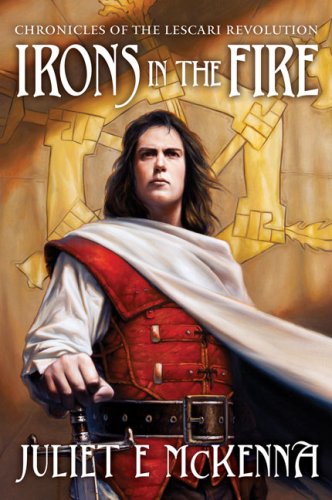I read the first of Juliet E McKenna‘s Lescari Revolution trilogy several years ago, and really enjoyed it. Then life happened and it took me a while to pick up the second book, at which point I thought, “God, I don’t remember this at all, I don’t remember how we got here or anything,” and read a couple chapters and thought, “No, this is just too unfamiliar, I need to read the…second…book,” as it turned out. I’d picked up the third accidentally. *laughs*
Anyway, by then it was all confused in my head so I decided I’d better start over at the beginning, which I did. :)
The trilogy, set in McKenna’s amazingly well developed world Einarinn, is about Lescar, a province of half a dozen dukedoms that have been at war with one another for generations, with the goal of eventually ruling over the fractured kingdom as High King. To summarize wildly, We The People are fed up with incessant war and throw a revolution to see if the bloodshed can be ended.
It is, in other words, a very topical read just now.
There are roughly half a dozen main characters, circled through with enough regularity that nobody’s storyline ever gets dropped out of mind. They range from scholars and spies to magic-users and nobility, men and women both, everyone with different motivations for what they’re doing. Some of them are right. Some of them are wrong. All of them are understandable. I love that. Some of my favourite characters, in fact, are effectively bad guys (and that’s just in terms of whose side people are on, nevermind the fact that there are a number of people who are mercenaries and there just so they can kill people. There’s not much sugar coating that!), and there’s one terrific side plot that carries a HUGE amount of weight with VERY little actual screen time. It’s magnificent!
Back when I read the first book originally, there were two characters in particular that I intially thought were being set up for what was clearly going to be a HORRIFICALLY DOOMED storyline. I said as much to Jules, who gaped at me and said she’d never even considered it, and later in the book it became clear that my initial perception was, indeed, wrong. (Relievingly so!) But I loved the fact that I found the possibility there, even if the author hadn’t, and of course it means I would have written those books entirely differently, because I’d have done that thing and there would have been Significant Doom.
I can’t, however, imagine writing them as well. There’s a real sense of weight and history in McKenna’s books, a clear vision of how all the pieces fit together, and I love that about these books. Really satisfying reads.
